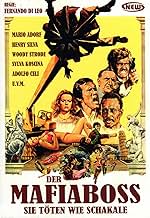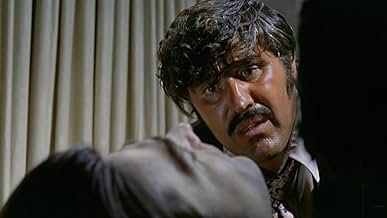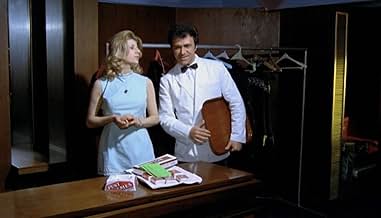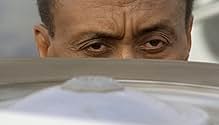NOTE IMDb
7,1/10
3,1 k
MA NOTE
Un proxénète milanais est poursuivi par - puis poursuit - deux tueurs à gages new-yorkais et les gangsters qui l'ont accusé d'avoir volé une cargaison d'héroïne.Un proxénète milanais est poursuivi par - puis poursuit - deux tueurs à gages new-yorkais et les gangsters qui l'ont accusé d'avoir volé une cargaison d'héroïne.Un proxénète milanais est poursuivi par - puis poursuit - deux tueurs à gages new-yorkais et les gangsters qui l'ont accusé d'avoir volé une cargaison d'héroïne.
- Réalisation
- Scénario
- Casting principal
Avis à la une
Poliziottesco, a fusion of the words poliziotto ("policeman") and the same -esco desinence, indicates 1970s-era Italian-produced "tough cop" and crime movies. Recurring elements in poliziotteschi films include graphic and brutal violence, organized crime, car chases, vigilantism, heists, gunfights, and corruption up to the highest levels.
With directors like Fernando Di Leo, these films replaced the spaghetti westerns. They saw their decline after erotica and horror took over in the late 70s.But it was the spaghetti westerns that gave Di Leo his training. He wrote the script for A Fistful of Dollars, and was assistant director under Sergio Leone in For a Few Dollars More.
The films of Fernando Di Leo had a great influence on later directors like Quentin Tarantino and John Woo.
Henry Silva(Ghost Dog: The Way of the Samurai, Above the Law) puts in one of his best performances in this film. He is excellent as a sleazy hit-man. Woody Strode (Spartacus, Kingdom of the Spiders) is very good as Silva's partner.
Lots of action, one car chase, and plenty of big naturals. Mario Adorf stole the show with his huge range of facial expressions.
With directors like Fernando Di Leo, these films replaced the spaghetti westerns. They saw their decline after erotica and horror took over in the late 70s.But it was the spaghetti westerns that gave Di Leo his training. He wrote the script for A Fistful of Dollars, and was assistant director under Sergio Leone in For a Few Dollars More.
The films of Fernando Di Leo had a great influence on later directors like Quentin Tarantino and John Woo.
Henry Silva(Ghost Dog: The Way of the Samurai, Above the Law) puts in one of his best performances in this film. He is excellent as a sleazy hit-man. Woody Strode (Spartacus, Kingdom of the Spiders) is very good as Silva's partner.
Lots of action, one car chase, and plenty of big naturals. Mario Adorf stole the show with his huge range of facial expressions.
When a shipment of heroin disappears enroute from Milan to New York a small time pimp named Luca Canali(excellent Mario Adorf)is fingered by the mafia for execution.There is only one problem...he is the wrong man!Unable to prove his innocence he is caught in a life and death struggle with the New York boss' hit men(Henry Silva and Woody Strode)."Hit Men"/"La Mala Ordina" is a typical Italian crime/drama with plenty of violence and sleaze.The acting is pretty good,the action almost never lets up and the ending is very exciting.Highly recommended if you are a fan of Italian cult cinema.
Two professional hit men from the States are hired to track down a small-time pimp Luca Canali in Milan, as this man was accused of the disappearance of a shipment of heroin between Milan and New York. Well that's what they are to believe by local crime boss Don Tressoldi. Their job is to brutally kill Luca and make a message of it. However Luca doesn't know why they want him and he won't go down too easy, as he tries to get to the bottom of it.
This confidently gritty 70s Italian crime thriller might start off slowly, but when it hits its strides. Boy it doesn't let up. What starts off talky where you are waiting for things to happen gets better as it moves along, where plot threads unfold and it suddenly becomes impulsively hazardous. There's one sensational car / foot chase sequence that packs brute force and never gives you a chance to catch a breath. It's very well done. Most of the action follows the same dynamic pattern. Thrilling, tough and intense with constant roughness. Fist fighting, scuffles and shootouts as the sweat pours and the bruises are inflicted. Hear and see it! Not escaping is the seedy hook, brassily loud instrumental score, compact camera-work and authentic European locations.
Some well known players feature in the cast. Woody Strode and Henry Silva are the American assassins. Strode plays the quiet, steady head and Silva's a live-wire, womanizer. Complete opposites, but the same rather deadly and downright bad-asses. This shows in the lethal cat and mouse climax in a car scrap-yard with Mario Adorf's character. Adorf holds his own with a respectable turn, constantly making a slip when the manhunt begins, but after a tragedy hits. Now he's fuelled by revenge going in head first. The script is just as jagged, as like the editing but there's a sardonic edge to it and the excessive melodramatics ups the emotions and motivations.
Hard-boiled, if bittersweet Italian crime entertainment.
This confidently gritty 70s Italian crime thriller might start off slowly, but when it hits its strides. Boy it doesn't let up. What starts off talky where you are waiting for things to happen gets better as it moves along, where plot threads unfold and it suddenly becomes impulsively hazardous. There's one sensational car / foot chase sequence that packs brute force and never gives you a chance to catch a breath. It's very well done. Most of the action follows the same dynamic pattern. Thrilling, tough and intense with constant roughness. Fist fighting, scuffles and shootouts as the sweat pours and the bruises are inflicted. Hear and see it! Not escaping is the seedy hook, brassily loud instrumental score, compact camera-work and authentic European locations.
Some well known players feature in the cast. Woody Strode and Henry Silva are the American assassins. Strode plays the quiet, steady head and Silva's a live-wire, womanizer. Complete opposites, but the same rather deadly and downright bad-asses. This shows in the lethal cat and mouse climax in a car scrap-yard with Mario Adorf's character. Adorf holds his own with a respectable turn, constantly making a slip when the manhunt begins, but after a tragedy hits. Now he's fuelled by revenge going in head first. The script is just as jagged, as like the editing but there's a sardonic edge to it and the excessive melodramatics ups the emotions and motivations.
Hard-boiled, if bittersweet Italian crime entertainment.
Poor Mario Adorf. He just wants to pimp out his girls in Milan and give the cash to his ex-wife and his sickly young daughter. He's not a bad guy really, although he doesn't like it when guys try to rough up his girls. Mario's just getting on with his petty criminal life when all of a sudden he's being hunted down not only by the local crime boss, but by two hard faced American hit men too.
The hit men, Henry Silva and Woody Strode, have been sent to track him down and kill him in the most violent and brutal way possible as lesson from the US Mafia to those in Italy thinking of stealing heroin shipments. This might be all well and good, if in fact Mario had actually stolen anything. Instead the poor guy spends most of the film being hunted down like a dog while having no idea whatsoever why people want to kill him.
There's more pressure on Mario as the local don (Adolfo Celi) doesn't like the presence of two American gangsters on his turf and sends his men out to capture Mario. Every petty criminal in Milan knows that Mario's a marked man, so who can he trust? His hookers?
While this is a little thin story wise, the film itself is rather good. Henry Silva truly looks like a guy who would stab you in the face one minute then put the moves on your wife the next. Woody Strode is the straight man to all Silva's shenanigans, and Adolfo Celi nearly outdoes Silva in the hard-case gangster role, especially at near the end where the demented Mario finally confronts him. It's Mario Adorf that steals the show here as the clueless, but not helpless, Mario, as he jumps from being a flawed but caring father to a man who has been pushed about as far as someone can be.
Although the first half sets up all the characters and has a punch up or two, the film gradually gets more and more violent as you would expect, and of course it's standard practice to throw in a car chase too. This one goes from a car chase to a foot chase and even has Mario smashing his head through a windscreen in order to get at a gangster. From then it's non-stop until the gunfight in the scrapyard.
Funky soundtrack too. Loud, with it.
The hit men, Henry Silva and Woody Strode, have been sent to track him down and kill him in the most violent and brutal way possible as lesson from the US Mafia to those in Italy thinking of stealing heroin shipments. This might be all well and good, if in fact Mario had actually stolen anything. Instead the poor guy spends most of the film being hunted down like a dog while having no idea whatsoever why people want to kill him.
There's more pressure on Mario as the local don (Adolfo Celi) doesn't like the presence of two American gangsters on his turf and sends his men out to capture Mario. Every petty criminal in Milan knows that Mario's a marked man, so who can he trust? His hookers?
While this is a little thin story wise, the film itself is rather good. Henry Silva truly looks like a guy who would stab you in the face one minute then put the moves on your wife the next. Woody Strode is the straight man to all Silva's shenanigans, and Adolfo Celi nearly outdoes Silva in the hard-case gangster role, especially at near the end where the demented Mario finally confronts him. It's Mario Adorf that steals the show here as the clueless, but not helpless, Mario, as he jumps from being a flawed but caring father to a man who has been pushed about as far as someone can be.
Although the first half sets up all the characters and has a punch up or two, the film gradually gets more and more violent as you would expect, and of course it's standard practice to throw in a car chase too. This one goes from a car chase to a foot chase and even has Mario smashing his head through a windscreen in order to get at a gangster. From then it's non-stop until the gunfight in the scrapyard.
Funky soundtrack too. Loud, with it.
The Italian Connection is yet another movie that proves conclusively that Fernando Di Leo was the master director of the poliziotteschi. These action-thrillers were Italy's answer to the violent crime films that emerged in America in the early 70's. Di Leo made several and this one may very well be arguably the best. Its story is underpinned by a shipment of heroin that is stolen en route from Milan to New York. A couple of American mafia hit-men are dispatched to Italy to find and kill the pimp who is accused of the theft. This man is innocent of this crime, however, and he proves to be a surprisingly resourceful opponent.
One of the main strengths of this movie is its cast. Everyone suits their roles very well. Mario Adorf is particularly excellent as the pimp who becomes the unlikely hero. Adorf puts in a very energetic performance that really drives the film. Poliziotteschi veteran Henry Silva and Woody Strode are suitably mean as the mafia killers, seemingly their pairing was the reason Quentin Tarantino cast John Travolta and Samuel L Jackson as the legendary hit-men in Pulp Fiction (for this alone The Italian Connection deserves a footnote in film history). Rounding things off we have Adolfo Celi (Danger: Diabolik) as the mafia don and Femi Benussi (Hatchet for the Honeymoon) gets substantially naked in a role as a prostitute.
Like most of these types of movies there is a lot of moral ambiguity here. There are no heroes in the truest sense. The identification figure is a low level pimp after all. This makes it a crime film in the truest sense. But it is also a very good action flick. Of particular note is a spectacular chase sequence where a van fires through town with a man hanging off the front while head-butting his way through the windshield! There is, overall, a healthy dose of violent action in general in this one, climaxing in a great scene in a junk-yard.
Along with Milan Calibre 9 and The Boss, this is a top level example of this kind of movie from Fernando Di Leo.
One of the main strengths of this movie is its cast. Everyone suits their roles very well. Mario Adorf is particularly excellent as the pimp who becomes the unlikely hero. Adorf puts in a very energetic performance that really drives the film. Poliziotteschi veteran Henry Silva and Woody Strode are suitably mean as the mafia killers, seemingly their pairing was the reason Quentin Tarantino cast John Travolta and Samuel L Jackson as the legendary hit-men in Pulp Fiction (for this alone The Italian Connection deserves a footnote in film history). Rounding things off we have Adolfo Celi (Danger: Diabolik) as the mafia don and Femi Benussi (Hatchet for the Honeymoon) gets substantially naked in a role as a prostitute.
Like most of these types of movies there is a lot of moral ambiguity here. There are no heroes in the truest sense. The identification figure is a low level pimp after all. This makes it a crime film in the truest sense. But it is also a very good action flick. Of particular note is a spectacular chase sequence where a van fires through town with a man hanging off the front while head-butting his way through the windshield! There is, overall, a healthy dose of violent action in general in this one, climaxing in a great scene in a junk-yard.
Along with Milan Calibre 9 and The Boss, this is a top level example of this kind of movie from Fernando Di Leo.
Le saviez-vous
- AnecdotesSecond part of Fernando Di Leo's "Milieu Trilogy" also including Milan calibre 9 (1972) and Le boss (1973).
- GaffesAs Nicola is dying, he is shown in a shot, looking at the ceiling, eyes glazed over as dead, but in the following shot, his head is turned to Luca before looking back at the ceiling, jutting his chin up, then settling back down, dead.
- Citations
Don Vito Tressoldi: Whad'ya expect from a hooker? Eternal love?
- ConnexionsFeatured in Dusk to Dawn Drive-In Trash-o-Rama Show Vol. 2 (1996)
Meilleurs choix
Connectez-vous pour évaluer et suivre la liste de favoris afin de recevoir des recommandations personnalisées
- How long is The Italian Connection?Alimenté par Alexa
Détails
- Durée1 heure 35 minutes
- Rapport de forme
- 1.66 : 1
Contribuer à cette page
Suggérer une modification ou ajouter du contenu manquant

Lacune principale
By what name was Passeport pour deux tueurs (1972) officially released in India in English?
Répondre
































